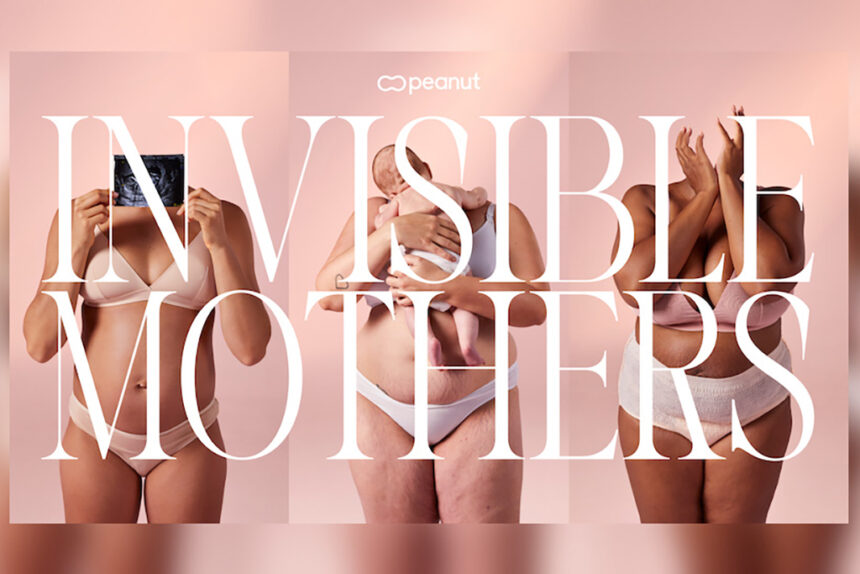Peanut, a social support app for current, expecting or hopeful mothers, released a campaign purposefully making women invisible. Headless women hold babies, breastfeed, juggle multiple children and more in an effort to visualize the invisibility felt by moms and pregnant women.
This feeling of being unseen is expansive, as reported in a study from the brand released today. The report, titled The State of Invisibility, quantified the negative effects of social stigmas mothers face. A startling 95% of the 3,615 women surveyed across the U.S. and UK said they felt unappreciated, unacknowledged or unseen — and 79% feel invisible.
Hannah Hastings, Peanut’s VP of brand, said the team was not startled to see the overwhelming majority of respondents note their experiences of loneliness or feelings of invisibility, as the platform was created for people to share those exact sentiments. But, while unsurprising internally, she expects the findings will shock those outside the platform and prove mothers are up against what she calls an “invisibility epidemic.”
The study was composed of women in many types of relationships, whether partnered or single, in same- or opposite-sex relationships, though Hastings noted the majority surveyed were in heterosexual partnerships. These pairings uncovered the deep-rooted sexism in the overall role of motherhood and overwhelming expectations they face, which are viewed as options for their male partners.
Another issue documented is the narrow scope of advertising aimed at parents. Advertising reinforces these narratives, noted Hastings, with many campaigns continuing to target moms and leave dads in the dust.
Leaving the father out of ads for parenting-related products and services means they “aren’t being targeted as parents, so they don’t have the expectation of making those purchasing decisions.” This reinforces societal burdens on women to make these types of choices.
As well, Hastings sees issues with erasing the “realities and struggles of motherhood and postpartum” in advertising as well. “Sometimes it’s not all joy and happiness —– sometimes it is rough —– and acknowledging those experiences as well is super important,” she said.
the accompanying campaign seeks to address not just the imbalance in the division of labor within romantic relationships but in overall interactions. “It’s not just about what’s happening between man and woman, it’s what’s happening with your friends, your coworker, your family and just society at large,” Hastings said.
Many women in the study shared their experiences of being left out of social gatherings due to assumptions that they would be busy with childcare, excluded from team meetings at work due to pregnancy and called first with childcare updates even when the father is listed as the primary contact.
Hastings hopes this portrayal of the realities of motherhood will resonate with its target audience of mothers and spark questions for those who may not feel the issue’s effects personally. Peanut’s campaigns feature women with the lived experiences that they are portraying to increase the level of authenticity for the viewer. The women in the Invisible Mothers campaign have all been through the experience they are portraying and were unretouched except to remove their heads.
This casting process is “more time consuming, but the most important things are, and you have to invest in these things,” she said.
Also laborious is the continued effort to address societal changes. The findings may be characterized as women’s issues, notes Hastings, but, “it’s not on us to fix it, it’s society.”
The fixes don’t just benefit the women, noted Hastings, but they help the general public. Equal and extended leave would benefit fathers as well, since they would be given more of an opportunity to spend valuable early moments with a new baby. If fixed, this would not only lessen the burden for the new mother, but it would also “create a starting point that is equitable” by giving fathers access to develop paternal bonds.
When the mother is trusted to make all of the decisions for their children or always called first by childcare providers, this not only unfairly burdens them, but could cause the father in the picture to “feel sidelined and like they’re not contributing or they’re not even trusted,” adds Hastings.
Peanut doesn’t expect things to change overnight as a result of this study, but hopes that continuing to sound the alarm on the lack of support and attention paid to mothers will communicate the importance of working for structural changes, offering straightforward solutions for businesses.
It’s also worth noting many of the findings, including the effects of unfair division of labor or lack of comprehensive workplace support, are not new discoveries. Hastings said in conversations with healthcare professionals “people don’t take this seriously if there isn’t fresh research.”
Healthcare professionals consulted for the study noted this is why it’s important to keep commissioning research showing the wide reach of these effects. “Even if it feels like you’re constantly saying the same thing over again and highlighting the same problem, it’s important because only then it might change.”
Small, interpersonal changes can also have an impact, as noted in Peanut’s study. Questions surrounding pregnancy and motherhood often do not center on a woman’s personhood, which leads to those feelings of invisibility.
Asking only about how a new baby is doing, for example, doesn’t give a new mother the chance to talk about how she’s holding up and if she’s enjoying being a new parent. In fact, 85% of respondents said they wish people would check in on how they were more frequently and only 13% of respondents said they were often asked about how they were postpartum.
“These small changes can have big impacts,” noted Hastings. “If we’re creating spaces where women can share on their own terms without feeling expected to give a certain answer, they’re going feel more compelled to tell their story authentically, and we can’t really ever empathize with and understand women if we don’t allow them to share their stories.”







